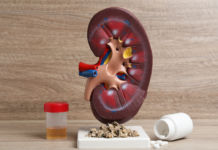*These statements have not been evaluated by the US Food and Drug Administration. This information is not intended to diagnose, treat, cure, or to prevent any disease. Always consult with a qualified healthcare professional prior to beginning any diet or exercise program or taking any dietary supplement. The content on our website is for informational and educational purposes only.
Written By: Steve L. Belcher, RN, MSN, MS, DN-CM
MRSA is a common bacterium that is found amongst many dialysis patients. In fact, the risk for invasive MRSA infections is 100-fold higher in dialysis patients than in the general population. Dialysis patients currently account for up to 15.9% of all invasive MRSA infections. So why is it wise for dialysis patients to be informed about MRSA?
What is MRSA?
MRSA stands for methicillin-resistant Staphylococcus aureus. Staphylococcus aureus, often referred to as “staph,” is a type of bacteria that is often present on skin or inside the nose of healthy individuals. If, however, these bacteria get under the skin, an infection can occur. Bloodstream infections also called septicemia, urinary tract infections, and pneumonia can also be caused by staph. Methicillin is a type of penicillin. The word resistant means that bacteria will no longer be killed by an antibiotic. MRSA is therefore a staphylococcus aureus organism that has become resistant to all penicillins.
Who gets MRSA?
Staph infections occur more often in people with weakened immune systems. Persons with chronic illnesses, such as diabetes and kidney failure, are therefore at a greater risk. According to the CDC, MRSA infections are seen more commonly in healthcare facilities such as hospitals, nursing homes and dialysis centers. Being treated in the same room as or close to another patient have not been in the hospital or nursing home can also get MRSA infections. People who are healthy and who have not been in the hospital or nursing home can also get MRSA infections. When a MRSA infection originates outside of the healthcare setting, it is known as community-acquired MRSA infection. With this type of MRSA, skin infections (pimples and boils) are commonly seen. People who have MRSA germs on their skin or who are infected with MRSA may be able to spread the germ to other people. In addition to being passed to patients directly from unclean hands of healthcare workers or visitors, MRSA can be spread when patients contact contaminated bed linens, bed rails, and medical equipment.

Can MRSA be prevented?
MRSA infections are more likely to spread from person-to-person if close skin-to-skin contact is present, hygiene is poor, living conditions are crowded, or skin is not intact. To help avoid a MRSA infection, the CDC recommends you:
- Keep your hands clean by washing thoroughly with soap and water or using an alcohol-based hand sanitizer.
- Keep cuts and scrapes clean and covered with a bandage until healed.
- Avoid contact with other person’s wounds or bandages.
- Avoid sharing personal items such as towels or razors.
MRSA can be treated, however, treating these infections are sometimes difficult. Following measures to avoid infections is, of course, the best approach. If you suspect you have a MRSA infection, seek medical attention from your healthcare provider.
About the author
Steven Belcher, RN, MSN, MS, is a dedicated kidney advocate who began his journey 20 years ago as a dialysis nurse. This job inspired him to help as many people with kidney disease as he could. Not only did he spent two decades caring for a patient’s physical and emotional needs in a clinical setting, but he also educated the public on the risk factors of kidney disease. Some of his many philanthropic successes include being a keynote speaker at the National Association of Nephrology Technicians/ Technologists (NANT), presenting at community spaces, and launching radio shows.
He now focuses his time entirely on his organization Urban Kidney Alliance, which educates the public about kidney disease. His goal? To lower rates of Chronic Kidney Disease in urban communities in Baltimore, Maryland, across the country, and globally through education and collaboration.
Steve has also written the book “HOW TO SURVIVE OUTPATIENT HEMODIALYSIS: A GUIDE FOR PATIENTS WITH KIDNEY FAILURE.” You can read the book review here.
Sponsored By: Kibow® Biotech

References
Center for Disease Control




